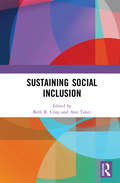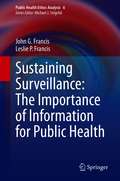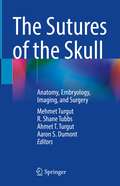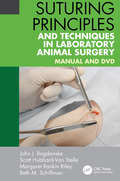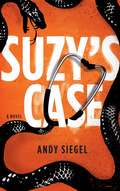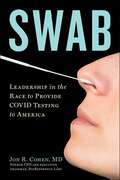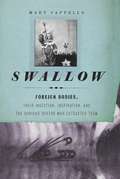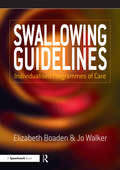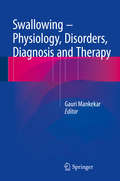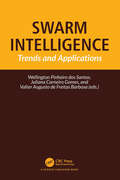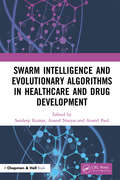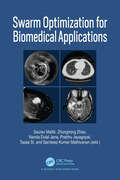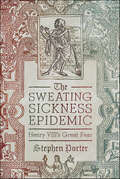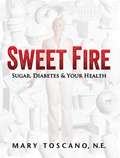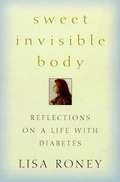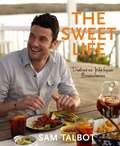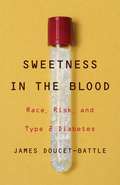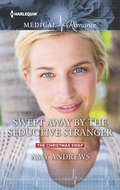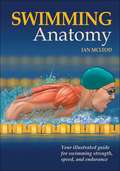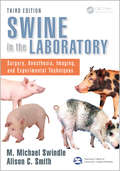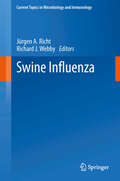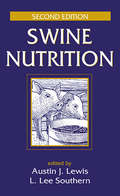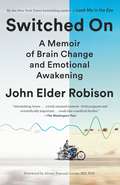- Table View
- List View
Sustaining Social Inclusion
by Beth R. Crisp Ann TaketSustaining Social Inclusion is the third book in a series on social exclusion and social inclusion. It explores what different understandings of sustainability mean in respect of social inclusion in the variety of fields that deal with human health and well-being. The book is global in its scope, with chapters relating to socially inclusive health and social welfare practice internationally. This book is divided into seven parts: Introduction; Sustainable policies for promoting social inclusion; Sustaining programmes which support social inclusion; Sustaining organisations which promote social inclusion; Sustainable social inclusion outcomes; Sustainable social development; and Conclusions. It examines how social inclusion can be sustained in the long-term when funding tends to be time-limited. This research-based book is relevant to a wide range of different readerships globally. It addresses issues of concern for those engaged in debates about the provision of health, social welfare, and other public services. Sustaining Social Inclusion will be of interest to academics, policy makers, and practitioners in a wide range of fields, including public health, health promotion, health sciences, history, medicine, philosophy, disability studies, social work, social policy, sociology, and urban planning.
Sustaining Surveillance: The Importance of Information for Public Health (Public Health Ethics Analysis #6)
by John G. Francis Leslie P. FrancisThis book presents a comprehensive theory of the ethics and political philosophy of public health surveillance based on reciprocal obligations among surveillers, those under surveillance, and others potentially affected by surveillance practices. Public health surveillance aims to identify emerging health trends, population health trends, treatment efficacy, and methods of health promotion--all apparently laudatory goals. Nonetheless, as with anti-terrorism surveillance, public health surveillance raises complex questions about privacy, political liberty, and justice both of and in data use. Individuals and groups can be chilled in their personal lives, stigmatized or threatened, and used for the benefit of others when health information is wrongfully collected or used. Transparency and openness about data use, public involvement in decisions, and just distribution of the benefits of surveillance are core elements in the justification of surveillance practices. Understanding health surveillance practices, the concerns it raises, and how to respond to them is critical not only to ethical and trustworthy but also to publicly acceptable and ultimately sustainable surveillance practices. The book is of interest to scholars and practitioners of the ethics and politics of public health, bioethics, privacy and data technology, and health policy. These issues are ever more pressing in pandemic times, where misinformation can travel quickly and suspicions about disease spread, treatment efficacy, and vaccine safety can have devastating public health effects.
The Sutures of the Skull: Anatomy, Embryology, Imaging, and Surgery
by Mehmet Turgut R. Shane Tubbs Ahmet T. Turgut Aaron S. DumontThis book provides an in-depth review of the sutures of the skull. The premature closure of the sutures of the skull (craniosynostosis) due to genetic or metabolic etiologies results in typical progressive skull deformity, due to both the inhibition of growth caused by the affected cranial suture and associated compensatory expansion of the skull along the open ones. Today, it is well known that early diagnosis of craniosynostosis is crucial for the best surgical outcomes and for the normal development of the brain and cosmetic appearance of the skull. As such, in addition to the anatomy, biology, genetics and embryology of the sutures of the skull, the book also covers the diagnosis and treatment of different forms of craniosynostosis such as metopism, and animal models for cranial suture research.This comprehensive work is a valuable resource for neuroscientists at all levels, from graduate students to researchers, as well as neurosurgeons, neuroanatomists, pediatricians, and neurologists seeking both basic and more advanced information on the unique structure of the sutures of the human skull.
Suturing Principles and Techniques in Laboratory Animal Surgery: Manual and DVD
by John J. BogdanskeSuturing Principles and Techniques in Laboratory Animal Surgery: Manual and DVD introduces the basic principles of, and the materials and instruments required for, suturing and wound closure on animals in a research or veterinary facility. The manual provides descriptions and pictures portraying proper tissue handling and aseptic technique during w
Suzy's Case
by Andy SiegelThis wild ride of a debut thriller is packed with insider details that reveal the fascinating world of a New York lawyer who'll stop at nothing to secure justice. Introducing Tug Wyler, a dogged and irreverent New York City personal injury and medical malpractice attorney. He is as at home on the streets as he is in the courtroom, and larger than life in both places. Once you've met him, you won't ever forget him. When Henry Benson, a high-profile criminal lawyer known for his unsavory clients, recruits Tug to take over a long-pending multimillion-dollar lawsuit representing a tragically brain-damaged child, his instructions are clear: get us out of it; there is no case. Yet the moment Tug meets the disabled but gallant little Suzy Williams and June, her beautiful, resourceful mother, all bets are off. With an offbeat, self-mocking style, Tug Wyler's a far cry from your ordinary lawyer. Unswerving in his dedication to his mostly disadvantaged clients, he understands only too well how badly they need him with the system stacked against them. Tug is honest about his own shortcomings, many of them of the profoundly politically incorrect variety, and his personal catchphrase, handy in all situations, is "At least I admit it." When his passionate commitment to Suzy's case thrusts him into a surreal, often violent sideshow, the ensuing danger only sharpens his obsession with learning what really happened to Suzy. Blending razor-sharp intuition, intellectual toughness, and endlessly creative legal brinkmanship, Tug determinedly works his way through a maze of well-kept secrets--encountering a cast of memorably eccentric characters along the way--to get to the truth. Among the many fresh-to-the-genre pleasures of Suzy's Case is its eye-opening portrait of the brutally tough world of medical malpractice law in New York City, an aggressive, very-big-bucks, winner-takes-all game in which lawyers relentlessly cut corners, deals--and throats. With Andy Siegel as the expert guide to his daily home turf, that largely unseen medicolegal universe, where life--and death--always have a price, you'll experience its addictive, risk-taking reality. The result is a stunning debut as gripping as it is unexpected, as rollicking as it is compassionate, revealing Andy Siegel to be a bright new voice of remarkable energy, wit, and style.
Suzy's Case: A Novel
by Andy SiegelThis wild ride of a debut thriller is packed with insider details that reveal the fascinating world of a New York lawyer who'll stop at nothing to secure justice. Introducing Tug Wyler, a dogged and irreverent New York City personal injury and medical malpractice attorney. He is as at home on the streets as he is in the courtroom, and larger than life in both places. Once you've met him, you won't ever forget him. When Henry Benson, a high-profile criminal lawyer known for his unsavory clients, recruits Tug to take over a long-pending multimillion-dollar lawsuit representing a tragically brain-damaged child, his instructions are clear: get us out of it; there is no case. Yet the moment Tug meets the disabled but gallant little Suzy Williams and June, her beautiful, resourceful mother, all bets are off. With an offbeat, self-mocking style, Tug Wyler's a far cry from your ordinary lawyer. Unswerving in his dedication to his mostly disadvantaged clients, he understands only too well how badly they need him with the system stacked against them. Tug is honest about his own shortcomings, many of them of the profoundly politically incorrect variety, and his personal catchphrase, handy in all situations, is "At least I admit it." When his passionate commitment to Suzy's case thrusts him into a surreal, often violent sideshow, the ensuing danger only sharpens his obsession with learning what really happened to Suzy. Blending razor-sharp intuition, intellectual toughness, and endlessly creative legal brinkmanship, Tug determinedly works his way through a maze of well-kept secrets--encountering a cast of memorably eccentric characters along the way--to get to the truth. Among the many fresh-to-the-genre pleasures of Suzy's Case is its eye-opening portrait of the brutally tough world of medical malpractice law in New York City, an aggressive, very-big-bucks, winner-takes-all game in which lawyers relentlessly cut corners, deals--and throats. With Andy Siegel as the expert guide to his daily home turf, that largely unseen medicolegal universe, where life--and death--always have a price, you'll experience its addictive, risk-taking reality. The result is a stunning debut as gripping as it is unexpected, as rollicking as it is compassionate, revealing Andy Siegel to be a bright new voice of remarkable energy, wit, and style.
Suzy's Case
by Andy SiegelThis wild ride of a debut thriller is packed with insider details that reveal the fascinating world of a New York lawyer who'll stop at nothing to secure justice. Introducing Tug Wyler, a dogged and irreverent New York City personal injury and medical malpractice attorney. He is as at home on the streets as he is in the courtroom, and larger than life in both places. Once you've met him, you won't ever forget him. When Henry Benson, a high-profile criminal lawyer known for his unsavory clients, recruits Tug to take over a long-pending multimillion-dollar lawsuit representing a tragically brain-damaged child, his instructions are clear: get us out of it; there is no case. Yet the moment Tug meets the disabled but gallant little Suzy Williams and June, her beautiful, resourceful mother, all bets are off. With an offbeat, self-mocking style, Tug Wyler's a far cry from your ordinary lawyer. Unswerving in his dedication to his mostly disadvantaged clients, he understands only too well how badly they need him with the system stacked against them. Tug is honest about his own shortcomings, many of them of the profoundly politically incorrect variety, and his personal catchphrase, handy in all situations, is "At least I admit it." When his passionate commitment to Suzy's case thrusts him into a surreal, often violent sideshow, the ensuing danger only sharpens his obsession with learning what really happened to Suzy. Blending razor-sharp intuition, intellectual toughness, and endlessly creative legal brinkmanship, Tug determinedly works his way through a maze of well-kept secrets--encountering a cast of memorably eccentric characters along the way--to get to the truth. Among the many fresh-to-the-genre pleasures of Suzy's Case is its eye-opening portrait of the brutally tough world of medical malpractice law in New York City, an aggressive, very-big-bucks, winner-takes-all game in which lawyers relentlessly cut corners, deals--and throats. With Andy Siegel as the expert guide to his daily home turf, that largely unseen medicolegal universe, where life--and death--always have a price, you'll experience its addictive, risk-taking reality. The result is a stunning debut as gripping as it is unexpected, as rollicking as it is compassionate, revealing Andy Siegel to be a bright new voice of remarkable energy, wit, and style.
Swab: Leadership in the Race to Provide COVID Testing to America
by Jon R. CohenBehind the scenes of the rush to create mass Covid testing programs overnight SWAB is the story of how BioReference Laboratories—working with no roadmap, no federal guidance or support, and no prior pandemic experience—established processes to test every imaginable segment of the American public. BioReference rose to national prominence as the &“first&” on many COVID testing frontiers: New York&’ s first drive-through testing site; the exclusive provider for the NBA &“Bubble&”; the exclusive testing provider for the NFL; the first to perform testing for New York City public schools; testing for the first cruise line (Royal Caribbean) to sail when the CDC order was lifted; the first to test thousands of fans for an NFL playoff game; and the first to develop large scale testing programs for testing thousands of people within one hour of special events.SWAB is the story of how Dr. Jon Cohen and his thousands of employees worked around the clock to create bespoke COVID mass testing programs from scratch literally overnight, addressing a series of seemingly insurmountable obstacles in the process. It is a case study of crisis leadership, and a visceral, relatable read for anyone who felt a cotton swab almost reach their brain while taking a Covid-19 test.
Swallow
by Mary CappelloThis is a book about a kind of cabinet of curiosities that is itself its own kind of cabinet of curiosities: beautiful, rare, eccentric, obsessional. One of the most popular attractions in the Mütter Museum, the world-famous medical museum in Philadelphia, is the Chevalier Jackson Foreign Body Collection: a beguiling set of drawers filled with thousands of items that had been swallowed or inhaled (both by accident and deliberately), including a crucifix, hundreds of safety pins, a toy goat, a padlock, and a "Perfect Attendance" pin.Mary Cappello uses Jackson's collection as a starting point for a lyrical, sympathetic exploration of swallowing-its meanings, its assumptions, its experiences, even its rhetoric. She restores the narratives, lives, and desires of the physician-artist Dr. Chevalier Jackson and his patients who haunt this uncanny collection and uncovers a history of racism and violence, of forced ingestion and "hysteria" (such as the woman who swallowed 26 open safety pins that interlocked in her stomach, along with a 4-meter length of string), of class and poverty that left children to bank their family's last quarters in their mouths (such as the boy whose father broke his arm when he failed to return from the hospital with the quarter he had swallowed). In Swallow, Cappello brings her original sensibility to bear on Jackson's 1938 autobiography as she highlights the achievements of this activist-inventor, probes his traumatic childhood, and brilliantly retells a life story rife with marvelous forms of rescue.As with Lawrence Weschler's Mr. Wilson's Cabinet of Wonders, in Swallow a collection of objects forms a surprising narrative that journeys deep into the nature of human experience. A literary and psychological exploration, the book seeks to understand rather than gawk at sword swallowers, women who lunched on hardware, and a boy who wasn't saved because he wasn't believed. Cappello invites us to enter the seat of human appetite, language, aggression, breath, and even knowledge-the human mouth-in an original and creative tour de force.
Swallowing Guidelines: Individualised Programmes of Care
by Elizabeth Boaden Joanne Walker Jo WalkerThis book and downloadable resources are the simple answer to a busy therapist's problem. It enables the therapist to meet their professional responsibility to inform patients and carers of relevant dysphagia instructions by designing contemporaneous written information, advice and therapy. Using downloadable resources, Swallowing Guidelines allow you to produce multiple individualised programmes that may be emailed or posted to the individuals, their carers or other professionals in any location. The programme sheets offer comprehensive advice covering all aspects of dysphagia care in clear unambiguous language. All that the therapist needs to do is highlight the sections pertinent to their patient and the programme is created. As the individual's status changes, the programme can be quickly amended to reflect their changing needs. The downloadable resources and accompanying template ensures that individualised programmes are comprehensive and produced efficiently thus maximising the use of clinical and administrative time. Elizabeth Boaden: Principal Speech & Language Therapist of Adult Service, teaches dysphagia at an undergraduate and post-graduate level to speech language therapists and nurses. She is currently studying for a PhD at the University of Central Lancashire on the efficacy of training pre-registration nurses to perform swallow screening. Jo Walker: Specialist Speech & Language Therapist, works in acquired neurology at Chorley South Ribble PCT. She also provides a Speech Language service for the Community Acquired Brain Injury Rehab Team and is currently seconded to the Cumbria and Lancashire Workforce Development Confederation, working on an educational project in acquired brain injury.
Swallowing - Physiology, Disorders, Diagnosis and Therapy
by Gauri MankekarSwallowing difficulty or dysphagia is a common disorder and affects all age groups from the newborn to the elderly. Several medical conditions like lack of dentition, gastroesophageal reflux disease, eosinophilic esophagitis, cardiomegaly and strokes can cause dysphagia. It can also follow head -neck surgeries. It is important to diagnose and treat dysphagia, otherwise it can lead to malnutrition and dehydration. Improved understanding of the physiology of swallowing, advances in endoscopic and radiological techniques along with an increasing elderly population has resulted in development of a separate swallowing disorders discipline. This book would be an aid for clinicians, educators and trainees from the fields of speech language pathology, pediatrics, otolaryngology, gastroenterology, oncology, neurology, geriatrics and rehabilitation, all of who form a part of the multidisciplinary swallowing team.
Swarm Intelligence: Trends and Applications
by Wellington Pinheiro dos Santos Juliana Carneiro Gomes Valter Augusto de Freitas BarbosaThis book presents the fundamentals of swarm intelligence, from classic algorithms to emerging techniques. It presents comprehensive theoretical foundations and examples using the main Computational Intelligence methods in programming languages such as Python, Java and MATLAB®. Real-world applications are also presented in areas as diverse as Medicine, Biology and industrial applications. The book is organized into two parts. The first part provides an introduction to swarming algorithms and hybrid techniques. In the second part, real world applications of swarm intelligence are presented to illustrate how swarm algorithms can be used in applications of optimization and pattern recognition, reviewing the principal methods and methodologies in swarm intelligence.
Swarm Intelligence and Evolutionary Algorithms in Healthcare and Drug Development
by Sandeep Kumar Anand Nayyar Anand PaulHealthcare sector is characterized by difficulty, dynamism and variety. In 21st century, healthcare domain is surrounded by tons of challenges in terms of Disease detection, prevention, high costs, skilled technicians and better infrastructure. In order to handle these challenges, Intelligent Healthcare management technologies are required to play an effective role in improvising patient’s life. Healthcare organizations also need to continuously discover useful and actionable knowledge to gain insight from tons of data for various purposes for saving lives, reducing medical operations errors, enhancing efficiency, reducing costs and making the whole world a healthy world. Applying Swarm Intelligence and Evolutionary Algorithms in Healthcare and Drug Development is essential nowadays. The objective of this book is to highlight various Swarm Intelligence and Evolutionary Algorithms techniques for various medical issues in terms of Cancer Diagnosis, Brain Tumor, Diabetic Retinopathy, Heart disease as well as drug design and development. The book will act as one-stop reference for readers to think and explore Swarm Intelligence and Evolutionary Algorithms seriously for real-time patient diagnosis, as the book provides solutions to various complex diseases found critical for medical practitioners to diagnose in real-world. Key Features: Highlights the importance and applications of Swarm Intelligence and Evolutionary Algorithms in Healthcare industry. Elaborates Swarm Intelligence and Evolutionary Algorithms for Cancer Detection. In-depth coverage of computational methodologies, approaches and techniques based on Swarm Intelligence and Evolutionary Algorithms for detecting Brain Tumour including deep learning to optimize brain tumor diagnosis. Provides a strong foundation for Diabetic Retinopathy detection using Swarm and Evolutionary algorithms. Focuses on applying Swarm Intelligence and Evolutionary Algorithms for Heart Disease detection and diagnosis. Comprehensively covers the role of Swarm Intelligence and Evolutionary Algorithms for Drug Design and Discovery. The book will play a significant role for Researchers, Medical Practitioners, Healthcare Professionals and Industrial Healthcare Research and Development wings to conduct advanced research in Healthcare using Swarm Intelligence and Evolutionary Algorithms techniques.
Swarm Optimization for Biomedical Applications
by Saurav Mallik Zhongming Zhao Nanda Dulal Jana Prabhu Jayagopal Tapas Si Sandeep Kumar MathivananBiomedical engineering is a rapidly growing interdisciplinary area that is providing solutions to biological and medical problems and improving the healthcare system. It is connected to various applications like protein structure prediction, computer-aided drug design, and computerized medical diagnosis based on image and signal data, which accomplish low-cost, accurate, and reliable solutions for improving healthcare services. With the recent advancements, machine learning (ML) and deep learning (DL) techniques are widely used in biomedical engineering to develop intelligent decision-making healthcare systems in real-time. However, accuracy and reliability in model performance can be a concern in tackling data generated from medical images and signals, making it challenging for researchers and practitioners. Therefore, optimized models can produce quality healthcare services to handle the complexities involved in biomedical research. Various optimization techniques have been employed to optimize parameters, hyper-parameters, and architectural information of ML/DL models explicitly applied to biological, medical, and signal data. The swarm intelligence approach has the potential to solve complex non-linear optimization problems. It mimics the collective behavior of social swarms such as ant colonies, honey bees, and bird flocks. The cooperative nature of swarms can search global settings of ML/DL models, which efficiently provide the solution to biomedical engineering applications. Finally, the book aims to provide the utility of swarm optimization and similar optimization techniques to design ML/DL models to improve the solutions related to biomedical engineering.
The Sweating Sickness Epidemic: Henry VIII's Great Fear
by Stephen PorterAmong the array of diseases which brought death to Tudor England, the sweating sickness stood out, for the speed with which it struck, its dreadful effects on its victims and the death rates which it produced, that together generated a fear verging on panic when it was identified. The sweating sickness attacked the cities, towns and the countryside, not sparing the palaces. It threatened everyone, from the king in his castle to the beggars at his gates, including members of the dynasty and the political structure, the courtiers and those who directed the government, the church and the law. Contemporaries could do little more than make a bolt for it, and that included the king and his closest advisors, who moved furtively in a small group from one house to another away from London. The principal epidemics came between 1485, when it made its first appearance, and 1551, and it was confined to England and Wales, apart from one major eruption across northern Europe in 1529. Known as the English disease, this rapidly acting virus became Henry VIII’s overriding fear, aggravating his well-known hypochondria and controlling his movements. The nature of the sweating sickness, its incidence and impact are all examined in this book, in the context not only of Tudor England and the problems of the Henrician succession, but also in the context of epidemic disease in Europe more widely. This book teases out the similarities and differences between ‘the sweat’ and its better-known, if equally feared, contemporary infectious disease, bubonic plague.
Sweet Fire: Sugar, Diabetes And Your Health
by Mary Toscano1 in 3 US adults will have diabetes by 2050. It's time to understand sugar. This condensed, quick read will bring you up to speed on the basics: - What is sugar? - The surprising amount of sugar we eat daily. - How sugar raises cholesterol and triglyceride levels. - What the body does with sugar. - The pathway to Type 2 Diabetes. - How to deal with sugar addiction. - Sweetener choices. - Plus, over 50 pages of recipes and strategies to add more healthy food to your diet. The options are clear: we either learn the facts about sugar and diabetes today, or live with their consequences tomorrow.
Sweet Invisible Body: Reflections on a Life with Diabetes
by Lisa RoneyAn uncommonly intelligent and honest look at how living with a disease can affect every aspect of a person's life. Diabetes is one of the strangest and most insidious of all diseases: a diabetic can give the appearance of robust health and often lead a long and active life, but within moments can be catastrophically ill, even dead. Diabetes is the seventh leading cause of death in the United States, where over 16 million people have the disease. The related statistics are staggering: diabetes makes an individual two to four times more likely to have heart disease or a stroke and it is the leading cause among adults, of blindness, renal disease, and lower-limb amputations. Lisa Roney was diagnosed with diabetes in 1972, just before her twelfth birthday. Sweet Invisible Body is her candid and exquisitely written account of living with a disease that directly impacts the choices she makes in every aspect of her life every day, from food and exercise to career and family. Moreover, and most remarkable, is Roney's willingness to intelligently explore and reveal the usually hidden consequences of living with a disease such as diabetes: how it erodes self-esteem, induces feelings of vulnerability, influences sexual choices, and leads to a heightened awareness of mortality. Full of wisdom, humor, and practical advice, Sweet Invisible Body will be welcomed by diabetics and their friends and families who have never had a spokesperson as articulate, honest, and insightful as Lisa Roney.
The Sweet Life: Diabetes without Boundaries
by Sam TalbotSam Talbot is a professional chef, restaurateur, surfer, painter, philanthropist, and, since the age of 12, type 1 diabetic. Yet he has not let the disease stop him from living a rich life packed with energy, adventure, and achievement--culinary and otherwise. In his first, much-anticipated book, he recounts how diabetes has affected but not compromised his life or career, and he shares his own tips--alongside those from other famous diabetics like Halle Berry, Larry King, and Tommy Lee--on how to handle everything from work and hobbies to relationships and travel with discipline and enthusiasm. To round out this advice, he offers bits of foodie wisdom and 75 innovative recipes for fresh, all-natural dishes anybody, diabetic or not, can prepare and enjoy. Heartfelt, entertaining, and backed by real-life experience and solid medical expertise, The Sweet Life will give readers hope, inspiration, and the proof they need to realize that life with diabetes isn't about diabetes: It's about living.
Sweetness in the Blood: Race, Risk, and Type 2 Diabetes
by James Doucet-BattleA bold new indictment of the racialization of science Decades of data cannot be ignored: African American adults are far more likely to develop Type 2 diabetes than white adults. But has science gone so far in racializing diabetes as to undermine the search for solutions? In a rousing indictment of the idea that notions of biological race should drive scientific inquiry, Sweetness in the Blood provides an ethnographic picture of biotechnology&’s framings of Type 2 diabetes risk and race and, importantly, offers a critical examination of the assumptions behind the recruitment of African American and African-descent populations for Type 2 diabetes research.James Doucet-Battle begins with a historical overview of how diabetes has been researched and framed racially over the past century, chronicling one company&’s efforts to recruit African Americans to test their new diabetes risk-score algorithm with the aim of increasing the clinical and market value of the firm&’s technology. He considers African American reticence about participation in biomedical research and examines race and health disparities in light of advances in genomic sequencing technology. Doucet-Battle concludes by emphasizing that genomic research into sub-Saharan ancestry in fact underlines the importance of analyzing gender before attempting to understand the notion of race. No disease reveals this more than Type 2 diabetes.Sweetness in the Blood challenges the notion that the best approach to understanding, managing, and curing Type 2 diabetes is through the lens of race. It also transforms how we think about sugar, filling a neglected gap between the sugar- and molasses-sweetened past of the enslaved African laborer and the high-fructose corn syrup- and corporate-fed body of the contemporary consumer-laborer.
Swept Away by the Seductive Stranger
by Amy AndrewsWhen that guy on the train turns out to be your boss! Nurse Felicity Mitchell's train journey of a lifetime is even more unforgettable when she meets Callum Hollingsworth. Neither is looking for temptation, but that doesn't stop them from sharing one hot, wild night! Except when they disembark, they learn that what happened on the train won't stay on the train. Because the gorgeous stranger is Flick's new boss...and it's increasingly difficult to keep their chemistry under control and leave it at just one night!
Swimming Anatomy (Anatomy)
by Ian McLeodSwimming Anatomy includes 74 of the most effective swimming exercises, each with step-by-step descriptions and full-color anatomical illustrations highlighting the primary muscles in action. Swimming Anatomy goes beyond exercises by placing you on the starting block, in the water, and into the throes of competition. Illustrations of the active muscles for starts, turns, and the four competitive strokes (freestyle, breaststroke, butterfly, and backstroke) show you how each exercise is fundamentally linked to swimming performance. You'll also learn how exercises can be modified to target specific areas, improve your form in the water, and minimize common swimming injuries. Best of all, you'll learn how to put it all together to develop a training program based on your individual needs and goals. Whether you are training for a 50-meter freestyle race or the open-water stage of a triathlon, Swimming Anatomy will ensure you enter the water prepared to achieve every performance goal.
Swine in the Laboratory: Surgery, Anesthesia, Imaging, and Experimental Techniques, Third Edition
by M. Michael Swindle Alison C. SmithFor two decades, Swine in the Laboratory: Surgery, Anesthesia, and Experimental Techniques has been the most respected practical technical guide for medical and veterinary researchers using swine as experimental animals. Extensively updated and expanded since the publication of the second edition in 2007 and now sponsored by the American College of Laboratory Animal Medicine (ACLAM), it continues to be the most authoritative source of scientific and technical information on the use of domestic and miniature swine in research.Additions to the Third Edition Include: New chapters on toxicology, transgenics, cancer models, and necropsy techniques An overview of porcine models that were not included in the previous edition Updates to chapters on the various body systems Contributions from 25 new coauthors, as well as a new coeditor Significant expansions to the accompanying downloadable resources, including new normal data on farm and minipig breeds, videos on training swine and surgical procedures, updated anatomical imaging, and a colored histological atlas Detailed sections on anesthesia, analgesia, and perioperative care present the best current practices for using swine in experimental surgery. Providing a deepened reference of the most current information and best techniques in an increasingly popular field since the publication of the first edition, this book is a vital tool in conducting the best possible research using porcine models.
Swine Influenza
by Jürgen A. Richt Richard J. WebbyFrom the first detailed clinical description of the disease in the Midwestern United States in 1918, to the isolation of the causative agent, the first of any influenza virus, in 1930 to its role in the genesis of the 2009 human pandemic, swine have played a central role in the ecology of influenza. Although not considered the major natural reservoir for influenza A viruses, swine are host to a limited but dynamic assortment of viruses. A number of subtypes of influenza A viruses of human and avian origin, including H1, H2, H3, H4, H5, H7, and H9, have been isolated from global swine populations. Most of these isolations have, however, been limited in number and it is only H1 and H3 influenza viruses that are known to have formed stable lineages in swine. In this respect, swine influenza viruses (SIV) are similar to their counterparts in humans where H1 and H3 viruses have also been maintained. The nature of these H1 and H3 viruses differ between the two host populations, however, and, as discussed throughout this book, are even different in swine populations in different geographic regions of the world due to multiple introductions of avian and human influenza viruses.
Swine Nutrition
by Austin J. Lewis L. Lee SouthernWith 42 chapters authored by leading international experts, Swine Nutrition: Second Edition is a comprehensive reference that covers all aspects of the nutrition of pigs. Content includes characteristics of swine and the swine industry with emphasis on the gastrointestinal tract; various classes of nutrients, how these nutrients are metabolized by swine, and the factors affecting their utilization; the practical aspects of swine nutrition from birth through gestation, lactation in sows, and the feeding of adult boars; and nutritional aspects of the various feedstuffs commonly fed to swine. Rounding the book is coverage of various techniques used in swine nutrition research.
Switched On: A Memoir of Brain Change and Emotional Awakening
by John Elder Robison Marcel Just Alvaro Pascual-LeonAn extraordinary memoir about the cutting-edge brain therapy that dramatically changed the life and mind of John Elder Robison, the New York Times bestselling author of Look Me in the EyeNAMED ONE OF THE BEST BOOKS OF THE YEAR BY THE WASHINGTON POST Imagine spending the first forty years of your life in darkness, blind to the emotions and social signals of other people. Then imagine that someone suddenly switches the lights on.It has long been assumed that people living with autism are born with the diminished ability to read the emotions of others, even as they feel emotion deeply. But what if we've been wrong all this time? What if that "missing" emotional insight was there all along, locked away and inaccessible in the mind? In 2007 John Elder Robison wrote the international bestseller Look Me in the Eye, a memoir about growing up with Asperger's syndrome. Amid the blaze of publicity that followed, he received a unique invitation: Would John like to take part in a study led by one of the world's foremost neuroscientists, who would use an experimental new brain therapy known as TMS, or transcranial magnetic stimulation, in an effort to understand and then address the issues at the heart of autism? Switched On is the extraordinary story of what happened next. Having spent forty years as a social outcast, misreading others' emotions or missing them completely, John is suddenly able to sense a powerful range of feelings in other people. However, this newfound insight brings unforeseen problems and serious questions. As the emotional ground shifts beneath his feet, John struggles with the very real possibility that choosing to diminish his disability might also mean sacrificing his unique gifts and even some of his closest relationships. Switched On is a real-life Flowers for Algernon, a fascinating and intimate window into what it means to be neurologically different, and what happens when the world as you know it is upended overnight. Praise for Switched On"An eye-opening book with a radical message . . . The transformations [Robison] undergoes throughout the book are astonishing--as foreign and overwhelming as if he woke up one morning with the visual range of a bee or the auditory prowess of a bat."--The New York Times "Astonishing, brave . . . reads like a medical thriller and keeps you wondering what will happen next . . . [Robison] takes readers for a ride through the thorny thickets of neuroscience and leaves us wanting more."--The Washington Post "Fascinating for its insights into Asperger's and research, this engrossing record will make readers reexamine their preconceptions about this syndrome and the future of brain manipulation."--Booklist"Like books by Andrew Solomon and Oliver Sacks, Switched On offers an opportunity to consider mental processes through a combination of powerful narrative and informative medical context."--BookPage "A mind-blowing book that will force you to ask deep questions about what is important in life. Would normalizing the brains of those who think differently reduce their motivation for great achievement?"--Temple Grandin, author of The Autistic Brain "At the heart of Switched On are fundamental questions of who we are, of where our identity resides, of difference and disability and free will, which are brought into sharp focus by Robison's lived experience."--Graeme Simsion, author of The Rosie Effect
